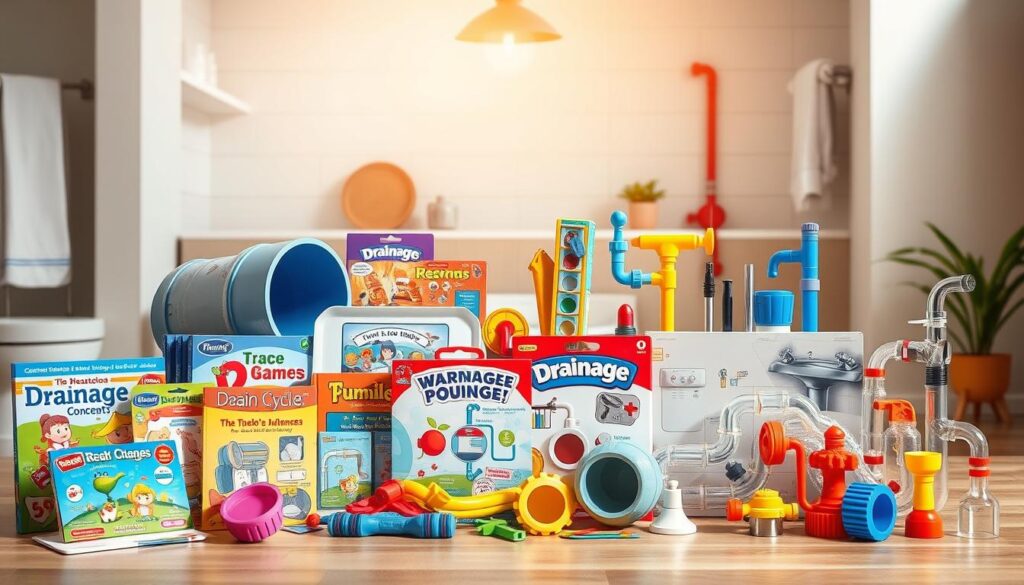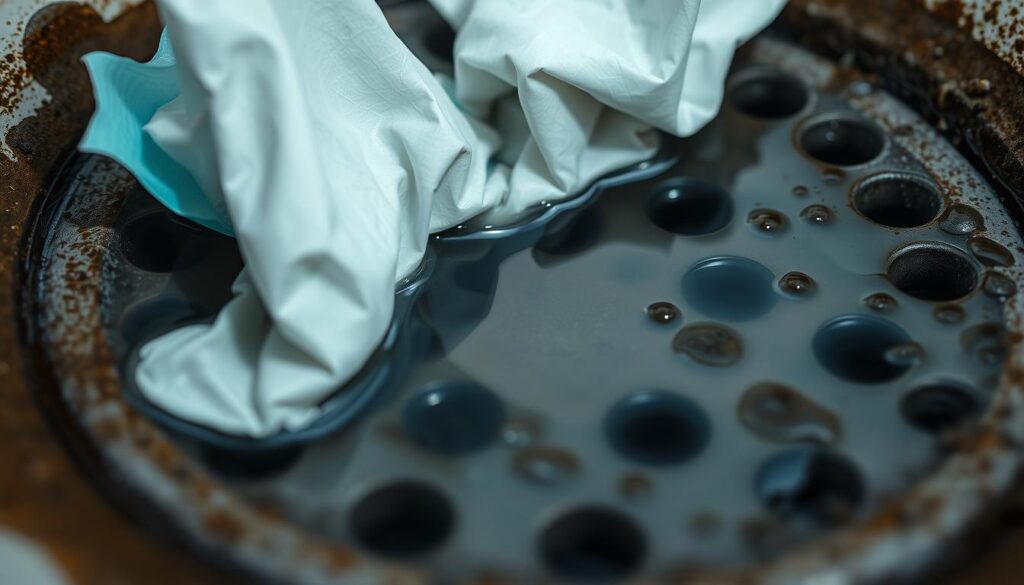We start by answering the question many parents and teachers search for: how do we teach children which items belong in pipes and which belong in the bin? This short guide explains how drains work and gives practical steps to protect plumbing at home and in the classroom.
We use clear examples, simple experiments and story ideas so children can see how water flows, what breaks down and what doesn’t. Our tips link to age‑appropriate books and playful activities that make sorting decisions fun.
We also outline useful products and affordable tools to model good habits and preview a product roundup ahead. If things go wrong, OnCall Emergency Plumbers in Melbourne are available 24/7 for blocked drains, burst pipes and leaks. Call 1800 571 216 or visit https://oncallemergencyplumbers.com.au/ for fast, reputable support.
Key Takeaways
- Teach kids simple rules they can repeat at home and in the classroom.
- Use stories, books and play to turn learning into action.
- Show how products and oils can block pipes with quick demos.
- Keep a few trusted products on hand to model good habits.
- If a blockage happens, call OnCall Emergency Plumbers for 24/7 help.
How we turn drain safety into a fun, hands‑on learning experience at home and school
We turn drain lessons into lively challenges that get kids handling, guessing and learning by doing.
Our sessions use short cooperative games and simple experiments so children predict outcomes and then observe what happens to water, oils and scraps. We set up water stations with strainers and filters so everyone sees how a mesh stops bits reaching pipes.
Roles rotate—collector, sorter, checker—so each child uses basic tools, reads labels and asks “bin, drain or compost?” We add cue cards, product mock-ups and toys to model pipes and traps. Movement breaks and relay-style rounds link learning to sports and active play.
- Safe, supervised play that repeats at home and in the classroom.
- Short games to test household products and practise good habits.
- Quick adult reset plans and 24/7 help if experiments reveal a real blockage: call OnCall Emergency Plumbers, Melbourne, 1800 571 216.
| Activity | Focus | Key props |
|---|---|---|
| Water station | Flow & straining | Mesh, bowls, measuring cups |
| Sorting relay | Decision practice | Cue cards, bins, timers |
| Pipe model | Journey of waste | Toys, tubes, product mock-ups |
Product roundup: books, games, toys and tools that make “what goes down the drain” easy to learn
Our roundup focuses on durable, child-friendly items that turn drain education into everyday habits. We prioritise picks that survive busy classrooms and family homes while reinforcing practical routines.

Picture books and storytime picks
Choose books that follow a drop of water or a cheeky pipe character. Look for bright illustrations, simple repetition and an obvious “bin it” message.
Play-based sorting games
We recommend fast-paced games that turn sorting food, paper and bathroom items into a team race. Timed rounds build automatic decisions and make habits stick.
STEM toys and classroom kits
Hands-on toys and kits let kids build pipe runs, test flow and add mesh screens. These tools link tinkering to real kitchen routines and garden care.
Posters, stickers and visual aids
Bright posters and sticker sets work as daily reminders. Use icons for the three Ps and a clear bin cue so messages are visible at sinks and toilets.
Kitchen accessories and outdoor ideas
Clip-in sink strainers, benchtop scrap bowls and labelled caddies help children prepare and tidy without risking a blockage. We also suggest garden demos using watering cans and mulch to show how soil soaks up runoff.
- Products shortlisted for durability and classroom use.
- Value bundles that pair posters, accessories and activity cards.
- Age guidance, storage tips and termly reassessments so items stay effective.
If a purchase reveals a plumbing fault — a cracked trap or blocked waste — our OnCall Emergency Plumbers team in Melbourne can assist 24/7 on 1800 571 216. We use reputable-brand materials at affordable rates to get lessons back on track.
Wet wipes school myths busted: what we teach kids about wipes, skin health and drains
Our lesson tackles confusing product labels and shows children why some items should never enter a toilet. We focus on simple facts and hands‑on observation so students understand damage without alarm.

Why “flushable” is confusing
Many items labelled flushable do not break down like toilet paper. They can tangle with fats and hair, forming blockages in pipes and at treatment screens.
Classroom demo: time‑in‑water test
We drop toilet paper and a wipe into clear jars and time how each behaves across one lesson. The visual comparison teaches critical thinking and shows which materials fragment and which hold their shape.
Safer choices for skin
For hands and faces we recommend fragrance‑free sanitising wipes with vitamin E and aloe, often sold in 40‑pack sizes (some listings show $2). Use them on skin, then always bin the used item.
Shopping cues kids can spot
We teach labels like “Available soon”, “In stock” and “Special order” so children read shelf info. Stock status or third‑party despatch details never change the rule: bin it, don’t flush it.
If a wipe has caused a blockage, our team offers 24/7 Melbourne support for blocked drains and leaks. For prompt, reputable help call or visit our blocked drains page at blocked drains Lilydale.
Everyday practice: food, oils, water and bathroom routines kids can master
Good daily habits make pipes happier — and kids learn quickly when tasks are simple and visible. We use short, clear steps at the bench and basin so routines stick.
Kitchen habits
We teach children to scrape every plate and bowl into the bin before rinsing so no food travels down the sink.
Leftover oil cools in the pan, we wipe it with a paper towel and bin that towel. Oils harden and cause blockages if they reach pipes.
Fitting a sturdy sink strainer is an everyday accessory. We make emptying it a child’s job to build ownership.
Bathroom habits
Only the three Ps belong in the toilet. Cards and stickers remind kids which items go in a lined bin with a lid.
We show that items such as wipes, cotton buds and floss always go in the bin, not the loo.
- Set a benchtop scrap bowl for peels and crumbs.
- Label kitchen and bathroom areas with simple posters and stickers.
- Rotate a “drain captain” to check strainers and bins each day.
We revisit routines weekly, praise progress and move accessories or products to reduce mistakes. If you discover a slow drain or leak while building routines, OnCall Emergency Plumbers is on call 24/7 across Melbourne for blocked drains, burst pipes and general plumbing. Phone 1800 571 216.
When projects go wrong: our 24/7 help for blocked drains, burst pipes and leaks
When a hands‑on activity reveals a blocked sink or sudden leak, quick, trusted help stops small problems becoming big ones. We respond day or night across Melbourne to protect people, buildings and routines.
Why call OnCall Emergency Plumbers in Melbourne
We offer 24/7 emergency plumbing for blocked drains, burst pipes and leaks. Our team diagnoses problems fast and explains repair options clearly.
Fast support for homes, school and sports facilities — quality, affordable repairs using reputable‑brand materials
We work in any setting: your home, a classroom or a sports change room. Our technicians fit reputable‑brand parts so repairs last and systems run reliably.
- Rapid response across Melbourne for urgent issues uncovered during activities.
- Transparent pricing and practical choices that balance cost and quality.
- We protect building fabric and health by containing leaks and checking for follow‑on risks.
- Advice on garden‑adjacent problems like roots or outdoor gullies to prevent repeat faults.
- Guidance on future‑proofing habits and useful products to reduce blockages.
Contact us any time: 1800 571 216
We stand behind our work and materials. Call 1800 571 216 or visit OnCall Emergency Plumbers for fast, reputable support across Melbourne.
Conclusion
We end with practical reminders so families and educators keep drains clear while children learn through play.
Simple rules make habits stick: scraps go in the bin, only the three Ps belong in the loo, and used wipes must be binned.
Keep using books, posters, games and labelled accessories to make the right action easy in kitchens, bathrooms and outdoor areas.
Questions are welcome and short, supervised experiments help children learn safely and confidently. If a blockage or leak appears despite best efforts, our Melbourne team is on hand 24/7 to restore flow quickly and affordably using reputable‑brand materials.
Call 1800 571 216 or visit https://oncallemergencyplumbers.com.au/. Please share this guide with your community to protect pipes, budgets and the environment.
FAQ
What should we teach children about what can and cannot go down a drain?
We explain the basics in simple terms: only toilet paper and bodily waste belong in the toilet. Food scraps, oils, cotton buds, sanitary items and cleaning cloths must go in the bin. We use hands‑on activities and visual aids so kids see how other items cause blockages and harm pipes and local waterways.
How can we make drain safety a fun, practical lesson at home or in class?
We run short experiments and play‑based sorting games that show what happens when items enter pipes. Picture books, stickers and role play keep it engaging. Simple kitchen demos using a sink strainer, scrap bowl and water bottles help students practise good habits.
Which learning products work best for teaching about drains and water?
We recommend picture books that explain water cycles and pipes, sorting games for food versus rubbish, STEM kits that model flow, and sturdy posters for bathrooms. Kitchen strainers, scrap bowls and clear demo toys make habits visible and memorable for kids.
Are "flushable" wipes safe for pipes and the environment?
No. Products labelled flushable often don’t break down like toilet paper and cause blockages in household systems and sewers. We teach children that all wipes, even those marketed as flushable, belong in the bin to protect drains and waterways.
How can we demonstrate the difference between toilet paper and wipes?
We use a time‑in‑water classroom demo: toilet paper disintegrates quickly, while most wipes remain intact. The visual comparison is clear and persuasive for young learners and helps reinforce correct disposal behaviour.
What type of skin‑friendly cleaning options do we suggest for kids?
We advise fragrance‑free, aloe or vitamin E hand sanitising wipes in small packs (around 40) for on‑the‑go needs, but always emphasise that after use they must be binned. These products balance skin care and responsible disposal.
What shopping cues should children and parents understand about product availability?
We teach simple labels children can spot: “in stock”, “special order” and “available soon.” Regardless of availability claims, our clear rule is that wipes go in the bin. This avoids confusion and keeps drain messaging consistent.
What kitchen habits should families adopt to protect drains?
We recommend scraping food into the bin, using a sink strainer for crumbs and peels, and never pouring cooking oils down the drain. These small routines prevent blockages and reduce the need for repairs.
What bathroom routines do we promote for kids?
We teach the “only the three P’s” rule for toilets: pee, poo and paper. All other items — wipes, cotton buds, dental floss and sanitary products — must be placed in a pedal bin with a lid for hygienic disposal.
Who should we call if a project or lesson leads to a blocked drain or leak?
We advise contacting a licensed emergency plumber. For fast, reliable service in Melbourne, call OnCall Emergency Plumbers. They provide 24/7 assistance for homes, schools and sports facilities using reputable‑brand materials and transparent quotes.
What number do we use for immediate plumbing help?
For urgent support with blocked drains, burst pipes or leaks, contact OnCall Emergency Plumbers on 1800 571 216 any time.
